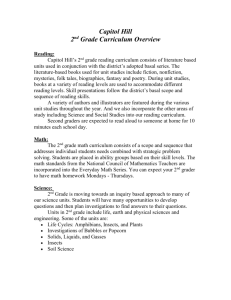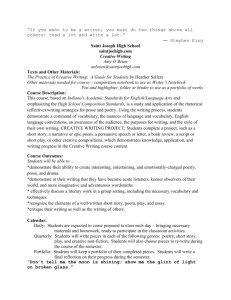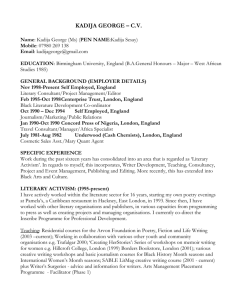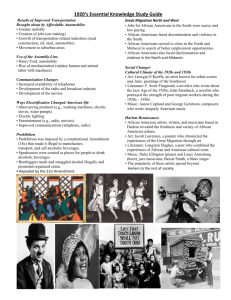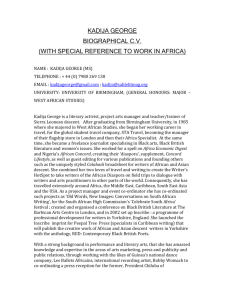English
advertisement
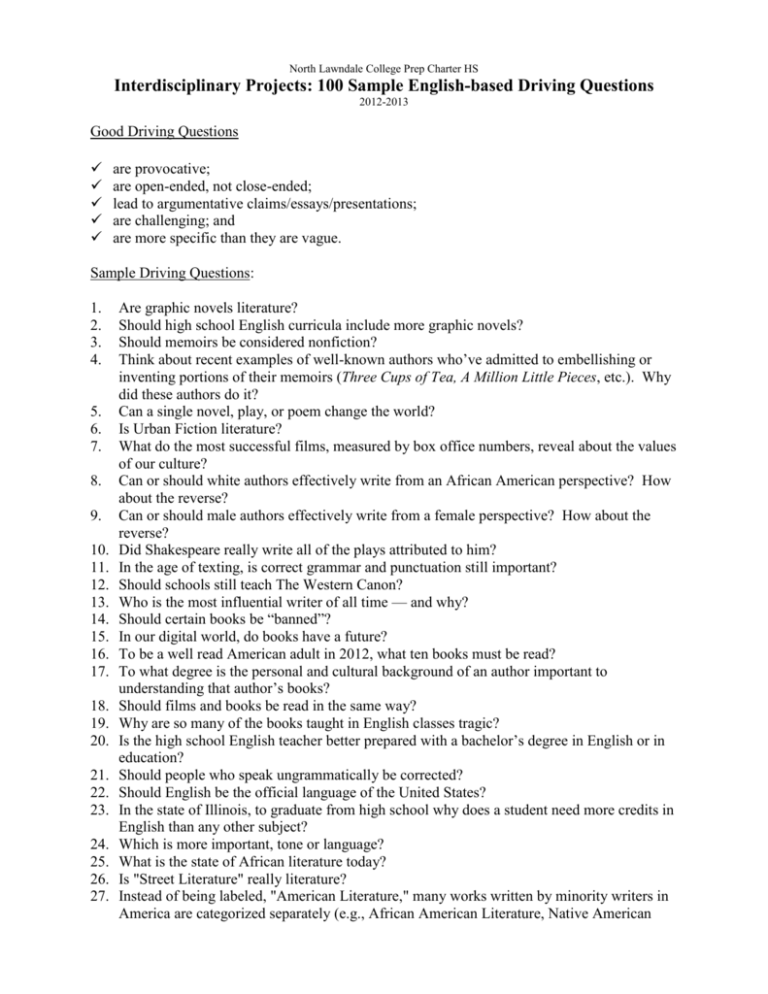
North Lawndale College Prep Charter HS Interdisciplinary Projects: 100 Sample English-based Driving Questions 2012-2013 Good Driving Questions are provocative; are open-ended, not close-ended; lead to argumentative claims/essays/presentations; are challenging; and are more specific than they are vague. Sample Driving Questions: 1. 2. 3. 4. 5. 6. 7. 8. 9. 10. 11. 12. 13. 14. 15. 16. 17. 18. 19. 20. 21. 22. 23. 24. 25. 26. 27. Are graphic novels literature? Should high school English curricula include more graphic novels? Should memoirs be considered nonfiction? Think about recent examples of well-known authors who’ve admitted to embellishing or inventing portions of their memoirs (Three Cups of Tea, A Million Little Pieces, etc.). Why did these authors do it? Can a single novel, play, or poem change the world? Is Urban Fiction literature? What do the most successful films, measured by box office numbers, reveal about the values of our culture? Can or should white authors effectively write from an African American perspective? How about the reverse? Can or should male authors effectively write from a female perspective? How about the reverse? Did Shakespeare really write all of the plays attributed to him? In the age of texting, is correct grammar and punctuation still important? Should schools still teach The Western Canon? Who is the most influential writer of all time — and why? Should certain books be “banned”? In our digital world, do books have a future? To be a well read American adult in 2012, what ten books must be read? To what degree is the personal and cultural background of an author important to understanding that author’s books? Should films and books be read in the same way? Why are so many of the books taught in English classes tragic? Is the high school English teacher better prepared with a bachelor’s degree in English or in education? Should people who speak ungrammatically be corrected? Should English be the official language of the United States? In the state of Illinois, to graduate from high school why does a student need more credits in English than any other subject? Which is more important, tone or language? What is the state of African literature today? Is "Street Literature" really literature? Instead of being labeled, "American Literature," many works written by minority writers in America are categorized separately (e.g., African American Literature, Native American 28. 29. 30. 31. 32. 33. 34. 35. 36. 37. 38. 39. 40. 41. 42. 43. 44. 45. 46. 47. 48. 49. 50. 51. 52. 53. 54. 55. 56. 57. 58. 59. 60. 61. 62. Literature, Chinese American Literature, etc.) Should these works be given a separate category or should they all be labeled "American Literature"? What is the cause for such strong similarities between Russian Literature and Latin American Literature? Which form of literary criticism is most appropriate to teach high school students? How much of what a writer puts in a text is intentional? What major factors must a translator consider when translating into English a book written in a foreign language? Who is more responsible for a child’s vocabulary acquisition: parents or teachers? What determines the life span of a word in the English language? Does reading fiction deepen readers’ empathy? When should writers stop revising? Are there any original stories? What is the purpose of art? Does a liberal arts education prepare students for living in a technological, skill-oriented society? What constitutes poetry? Is it more important for students to explore/read texts from the traditional canon of literature? Or is it more valuable to read texts that are relatable and interesting? Should hip hop/rap be considered poetry? Should it be studied in schools? How has hip-hop/rap changed since its beginnings in the 70s/80s? What does this change say about today's society/pop culture? What is "crap rap"? Who listens to it? Is it a valid term? Which American authors would best help other people from other countries understand America? Which novels can be used to teach history? Why should all students read Shakespeare? Is Harry Potter literature? Is there any benefit to reading books like Twilight? What one book should every high school student read and why? Can a book/novel influence someone to commit a crime? Should people who speak ungrammatically be corrected? Should English be the official language of the United States? Based on the dramatic writing of August Wilson what would he say about the progression/regression of African Americans? How is the popularity of E-books affecting the quality of our reading? Has our expanded access to written and artistic expression through online resources affected our critical thinking? Should ‘classic’ literature that could be considered racist and sexist in the modern world be looked at as flawed or be excused as allowable perspectives of the time period in which they were written? Is Shakespeare guilty of plagiarism? Do Shakespeare’s plays remain relevant enough to be taught in every high school every year? Do the reading and writing we do texting, tweeting, and participating on Facebook improve or damage literacy skills? Do reading aptitude tests accurately measure a student’s ability to go to college? Should certain individuals be allowed to choose which books are banned? How does the ‘cannon’ prepare people for what they might encounter in society? 63. Should schools expose students to advanced placement literature courses if students’ reading ability is below grade level? 64. Should works of literature that may be deemed explicit or sexually graphic be permitted on school grounds? 65. How much should freedom of speech apply to literature? 66. With the influx of Kindles and the Nook what will be the future of the written, printed text? 67. Is computer literacy related to reading proficiency? 68. How is the teaching of reading strategies working with reading ability for students in school? 69. What influences a child to begin reading and enjoying literature? 70. Is grammar related to reading ability? 71. Does the interpretation of poetry take away from the author’s intentions? 72. How would literature change if the publishing world did not edit what the public was able to read? 73. Why are so many Latin American writers inspired by William Faulkner? 74. Why do so many Latin American writers use magical realism to tell their stories? 75. How do male writers capture a female experience? Can they? 76. Pick a culture (Native American, Chinese, Brazilian, West African, etc.): What one book captures the experience of that culture? Is it possible for a book to do so? 77. Can a white writer accurately portray the Native American experience? 78. Where did the English language come from? 79. Was poet/musician Gil Scott-Heron the first rapper? 80. How does the poetry of Saul Williams capture the experience of African Americans? 81. What is the influence of the Last Poets and the Nuyorican poetry movement on hip hop culture? 82. How does geographic location/climate influence literature? 83. What is the role of the trickster in literature across cultures? 84. How did communist thought/ideology influence African American writers (Richard Wright, Ralph Ellison, etc.) in the 20th century? 85. Can a book change the world? 86. How do oppressed peoples use literature to mount campaigns of resistance? 87. How did minstrel shows influence African American writers in the 20th Century? 88. Was Richard Wright correct when he criticized Zora Neale Hurston and called her a minstrel? 89. How did the writing of Black Panthers (Assata Shakur, Bobby Seale, Eldridge Cleaver, etc) inspire African Americans in the second half of the 20th Century? 90. How has literature contributed to the progress of social movements (women’s liberation, gay rights, civil rights, etc.)? 91. What are the major themes of Afro-Caribbean literature and what are its influences? 92. Is blues music literature? How have the Blues influenced African American writers? 93. Are modern-day rappers minstrels? How does their art compare to antebellum minstrel art? 94. Why were African slaves in America not permitted to read? 95. Why have the governments of some countries banned certain books? What are they afraid of? 96. Why does the United States have a poet laureate? 97. How politically motivated is the Nobel Prize for Literature? 98. Which is the more difficult exam, the AP English Literature exam or the AP English Language exam? 99. Is standardized testing of English grammar and vocabulary biased? 100. Which is more important, written or spoken language?





